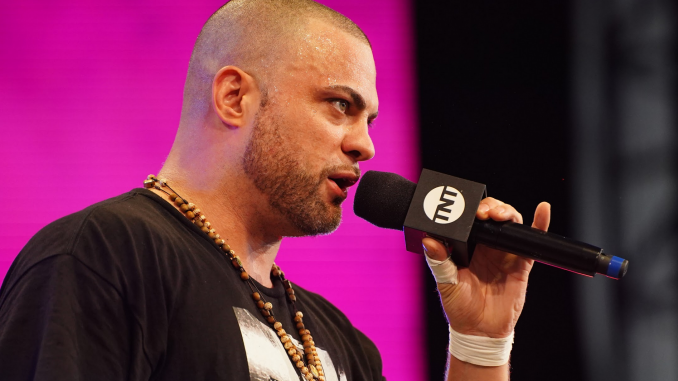
SPOTLIGHTED PODCAST ALERT (YOUR ARTICLE BEGINS A FEW INCHES DOWN)...
A few weeks ago, Players Tribune published a fascinating, poignant piece by Eddie Kingston, about both his journey in pro wrestling and in life more broadly. Eddie’s disclosures about his experiences with depression and panic attacks offer important lessons for understanding and treating these problems. (All sections in italics are quotes from Eddie’s article.)
DIAGNOSING DEPRESSION
“The only thing that saved me from jail was the fact that I was so young. I was just an angry, angry, angry kid. I wanted to fight the world… I have been everything in this life. I have been an angry kid. I’ve been a depressed teenager. I’ve been an addict.”
To be diagnosed with clinical depression, one must be experiencing a Major Depressive Episode. These are the diagnostic criteria for a depressive episode:
- Depressed mood (pervasive feelings of sadness)
- Loss of interest in activities once found pleasurable/difficulty experiencing any pleasure
- Significant changes in appetite or weight (could be weight loss or gain, or over or undereating)
- Disturbances in sleep (sleeping excessively or very little)
- Significant fatigue
- Excessive guilt
- Difficulties in concentration
- Thoughts or images of suicide or death
For the diagnosis, one must have one or both of those first two symptoms (the depressed mood or great difficulty experiencing joy) and five of the nine symptoms total. You do not have to be a math major to realize that there are a lot of potential ways someone could cross off nine symptoms from that list; 227 ways, in fact!
Did you notice what was missing from the diagnostic criteria? Anger! But we should see this as simply a limitation of the current criteria. In truth, people who are clinically depressed, particularly men, frequently present with anger of the kind Eddie describes throughout the article. Ask any clinician who has worked with people who are depressed if they have noted heightened irritability or anger in folks with depression. You will receive a nod in the affirmative.
Eddie also mentions addiction. Substance use disorders commonly co-occur with depression. Popular lore has it that people drink alcohol or use other drugs to “self-medicate” their depressive symptoms. This does happen. However, sometimes misusing substances predates the depression, or both seem to occur simultaneously.
RISK FACTORS
I never felt like I fit in anywhere. I was half Irish, half Puerto Rican, so I was getting it from all sides. When I was in the Irish part of the neighborhood it was, “Hey, what’s up spic.” And when I was in the Puerto Rican part of the neighborhood it was some other nonsense. Seriously, in the second grade I remember hearing, “Hey, get this spic outta here.”
We know that experiences of poverty, racism, and discrimination are risk factors for developing clinical depression. To wit: individuals who are impoverished, ethnoracial minorities, or both develop depression at higher rates than other folks.
Rates of depression are also influenced by genetics, as well as a plethora of environmental factors, many of them not well-understood. Fortunately, depression’s causes do not necessarily matter for its treatment. As an analogy: I might not know why I have a headache, but I can take Advil to treat it, even though “lack of Advil” was not the cause of my headache; “the cure” did not have to match “the cause.” Similarly, effective treatments for depression exist that help people regardless of how they developed depression.
TREATMENTS
“And that’s why I’m telling this story, and I’m not pulling any punches, and all the old-school guys who don’t want to hear this stuff and think that we shouldn’t talk about it, those guys can respectfully kiss my ass. If I wasn’t on Zoloft, if I wasn’t getting help for my mental health, if I was too afraid to talk about this stuff, I’d end up killing myself. Period. I’ve lost too many friends in this business to shut my mouth and bury all of these emotions with pills and booze.”
The treatments that work for depression are varied. The most well-known treatments involve psychotherapy, medication, or both.
Eddie mentions Zoloft (sertraline), which is a common medication for depression.
Scientific evidence indicates that therapy works about equally well as medications for depression. There are many options for therapies that work. Therapy typically (though not always) has fewer side effects than medications. However, medication usually involves “less effort” and can be less time consuming and costly than therapy. Sometimes, treatment persist for years, though in other cases a mere few months of treatment may provide for long-lasting remission of depression.
Depression puts one at a higher risk for suicide. You’ll recall that suicidal thoughts are even a diagnostic criterion of clinical depression. All remarks about an individual about dying by suicide should be taken seriously. Suicidal intention is not exclusive to depression, and it can occur for a myriad of reason. (If you are thinking about trying to kill yourself, know someone who is, or are otherwise in a mental health crisis, call the National Suicide Prevention Lifeline at 1- 800-273-8255.)
PANIC ATTACKS
“I still have panic attacks.
As a matter of fact, I had one right after I fought Miro at the All Out PPV. My phone started blowing up with all these people telling me great job, just showing me love, and I just couldn’t handle it. I got overwhelmed. My chest got tight. The walls started closing in. I started to go numb. It felt like I was breathing through a straw. But I was able to calm myself down and slow my breathing, because I’d been strong enough to reach out and get professional help, and I know what to do now. I know how to live with my anxiety and depression. And I’m not afraid to talk about it. I don’t care what the old-school guys in the business have to say about it. It ain’t 1987 no more.”
Many people with clinical depression also experience panic attacks. Panic attacks are associated with a multitude of anxiety disorder diagnoses. There are various medication options for panic attacks and associated anxiety disorders. However, the clear front-runner for panic attack treatment among therapies is a form of cognitive behavioral therapy (CBT) that emphasizes systematic exposure.
Systematic exposure helps people engage with “triggers” for their panic attacks. These triggers might be a person, place, object, or feeling. (In Eddie’s case, notifications on his phone about the quality of his match.). People confront their triggers in a particular sequence and allow themselves to experience the bodily sensations associated with their panic attacks.
This can serve to both decrease the severity and frequency of the sensations, but more importantly, when combined with other CBT techniques, can help change how the person mentally relates to the symptoms of a panic attack. Ultimately, many people can improve to where they have few to no panic attacks, and when they do have a panic attack, it is substantially less frightening than it was before. Given how limiting panic attacks can be in people’s lives (for example, a wrestler may avoid driving or flying entirely because of it), engaging in a panic attack treatment that works can be one of the best things a wrestler does for their health and career.
IMPROVING THE SYSTEM
By sharing his concerns, Eddie helps normalize accessing care. Awareness of treatment is great; once awareness exist, easy access to care is critical.
It can be understandably difficult to figure out if the private actions of wrestling promoters regarding mental health match their public words. Wrestling journalists can continue to try to make this determination and highlight promoters who are champions of mental health access versus who are not. Fans can insist on promotional transparency about medical and mental health policies.
In the meantime, when wrestling leadership speaks out publicly about the importance of wrestlers seeking mental health treatment, as AEW’s Tony Khan has recently done and several AEW wrestlers did in a video today, they should be applauded for doing so. Outside of wrestling, organizations with leadership that establish a culture of normalcy around accessing mental health care increase the probability it will be accessed. The same is likely true within wrestling. Promoters and power brokers in wrestling owe it to their wrestlers to establish that culture. As Eddie Kingston said, It ain’t 1987 no more.
(Dr. Alex Williams is a licensed clinical psychologist and teaching professor at the University of Kansas. He is a designer of the Rampage Wrestling computer game. Alex conducts scientific research on the credibility of evidence for different psychotherapies. In addition to publishing his research in academic journals, Alex is a TEDx Talk speaker and has bylines with MMA Torch, Scientific American, and Aeon Magazine. He can be reached on Twitter @williamspsych or via email at alexwilliams123 [at] gmail [dot] com. This article does not constitute professional mental health advice; for more information on depression and panic attack treatment, visit the website of the Anxiety & Depression Association of America.)
I'm so happy this came together so perfectly. Thank you to each of these stars for sharing their personal mental health journeys. I'm very proud to know them. (If you or someone you know is struggling, there is some helpful info at the end of the video.) pic.twitter.com/g9gIpztmIu
— Hollywood Hunk Ryan Nemeth (@ryrynemnem) November 28, 2021




Leave a Reply
You must be logged in to post a comment.